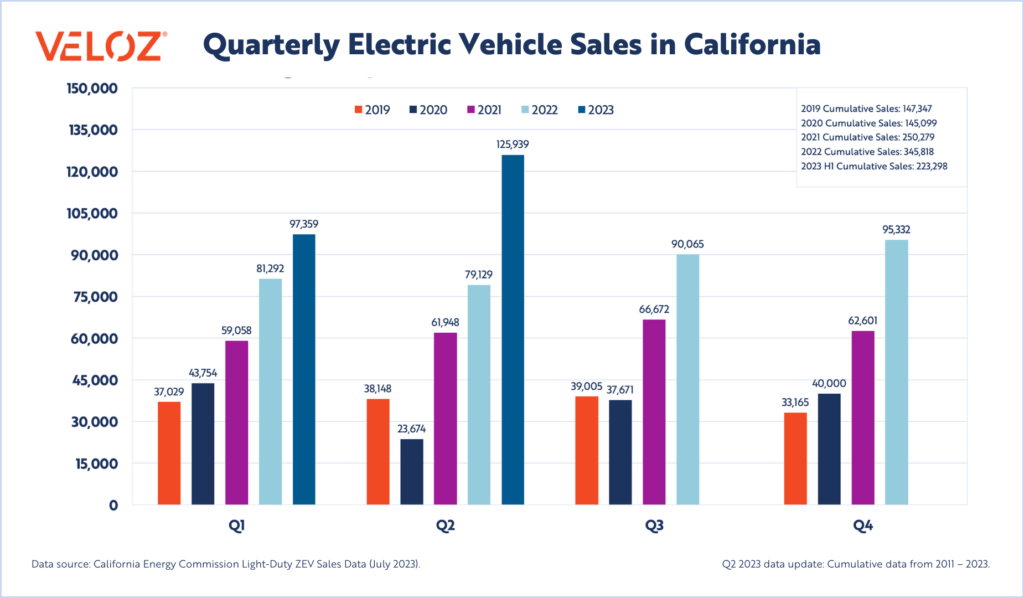California has long been a champion of electric vehicles (EVs) in the United States, leading the way in the adoption and promotion of clean transportation. According to the latest registration data from the California New Car Dealers Association (CNCDA), one-fifth of the vehicles sold in the state are powered by batteries, signaling a significant shift towards electric mobility. This figure represents a remarkable increase from just a few years ago, highlighting the growing popularity of EVs among Californian consumers.

In the first nine months of this year, electric vehicles accounted for an impressive 21.5% of all automobiles sold in California, more than doubling the market share in the last two years. The trend is even more striking when considering a broader range of electrified vehicles, including hybrids, plug-in hybrids, and fuel-cell vehicles. When these options are included, the figure jumps to 35.4%, a substantial increase from the 11.6% recorded in 2018.
Conversely, the market share of internal combustion engine (ICE) vehicles has been steadily declining in California. Gasoline- and diesel-powered vehicles now make up only 64.6% of new car sales year-to-date, down from 71.6% in 2022 and a significant drop from 88.4% in 2018. This decline in ICE sales is a testament to the growing preference for cleaner and more sustainable transportation options in the state.
Teslas Impact on California EV Sales in Q2 2023
Tesla, a company founded in California, continues to dominate the electric vehicle market in the state. In the first three quarters of this year, Tesla’s overall market share of electric vehicles stood at an impressive 62.9 percent. The Tesla Model Y and Model 3 are particularly popular among Californian consumers, with sales of 103,398 and 66,698 units, respectively. In fact, the Model Y is currently the top-selling vehicle overall in California, followed by the Model 3, the Toyota RAV4, and the Toyota Camry.
Despite Tesla’s strong presence, other automakers are gradually gaining ground in California’s EV market. Brands like Chevrolet, BMW, Mercedes, Hyundai, Volkswagen, and Kia have been steadily increasing their market share, challenging Tesla’s dominance. Toyota remains the sales leader in the state, capturing 15 percent of new car sales, closely followed by Tesla at 13.5 percent. The competition between these manufacturers will likely intensify as the demand for electric vehicles continues to grow.
California an EV Trendsetter
California’s success in promoting EV adoption is significant not only for the state but also for the entire country. As a trendsetter in automotive preferences and government policies, California often sets the stage for nationwide shifts in transportation choices. While the state’s share of electric cars exceeds one-fifth of all vehicles sold year-to-date, the figure for the entire United States stands at a mere 7.4 percent. California’s commitment to clean transportation extends beyond market share, as the state has also banned the sale of gas-powered vehicles starting in 2035. The increasing sales of electric cars suggest that this ban may not even be necessary, as consumers willingly embrace the EV revolution.
AB 473 Passage and its Effect on California EV Sales
In addition to the remarkable EV sales figures, California’s new car dealers recently scored a significant victory in the legislature with the passage of AB 473, a new law that strengthens dealer franchise protections. The law includes several provisions that benefit dealers, such as preserving the integrity of the franchise system, ensuring equitable DC fast charging programs, limiting post-sale subscriptions, mandating transparent reservation processes, and requiring reimbursement for non-compliant digital services. This legislation reflects the influential role that dealerships play in shaping state policies and highlights their ongoing relevance in the automotive industry.
The passage of AB 473 is especially significant in light of recent tensions between dealers and manufacturers regarding installing fast chargers. Ford CEO Jim Farley’s ultimatum to dealers, demanding the installation of fast chargers to maintain their involvement in Ford’s electric vehicle sales process, led to pushback from dealers who claimed the mandate was burdensome and costly. The equitable fast-charging provision in AB 473 can be seen as a direct response to this conflict, ensuring that manufacturers bear their fair share of the costs associated with charging infrastructure.
Another noteworthy provision of AB 473 addresses the issue of post-sale subscriptions. The law limits manufacturers’ ability to charge additional fees for features already integrated into the vehicle, protecting consumers from unexpected costs after their purchase. This provision may also reflect dealers’ desire to participate in the revenue generated by post-sale subscriptions, highlighting the ongoing evolution of the automotive business model.
Overall, the passage of AB 473 and the increasing market share of EVs in California demonstrates the state’s commitment to sustainable transportation and the ongoing transformation of the automotive industry. While Tesla continues to dominate the EV market, other manufacturers are making significant strides in capturing market share. California’s influence extends beyond its borders, with shifts in preferences and government policies often spreading to the rest of the country.
As the market for electric vehicles continues to grow, it is clear that California is at the forefront of this revolution, leading the way towards a cleaner and more sustainable transportation future.